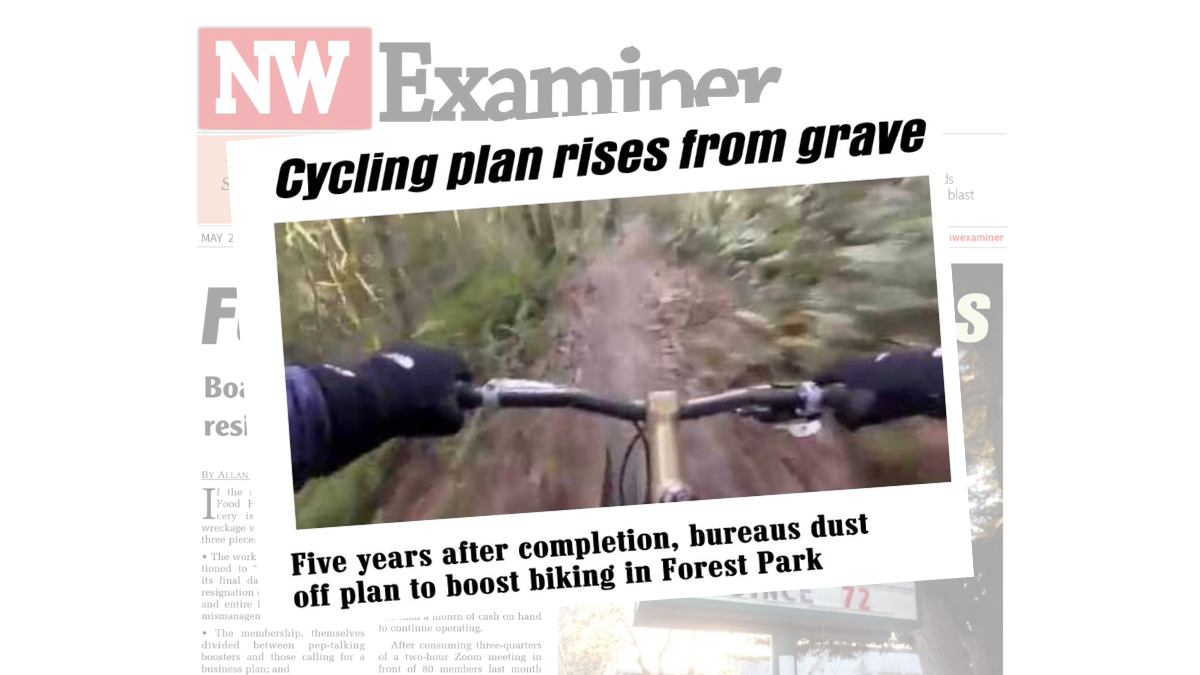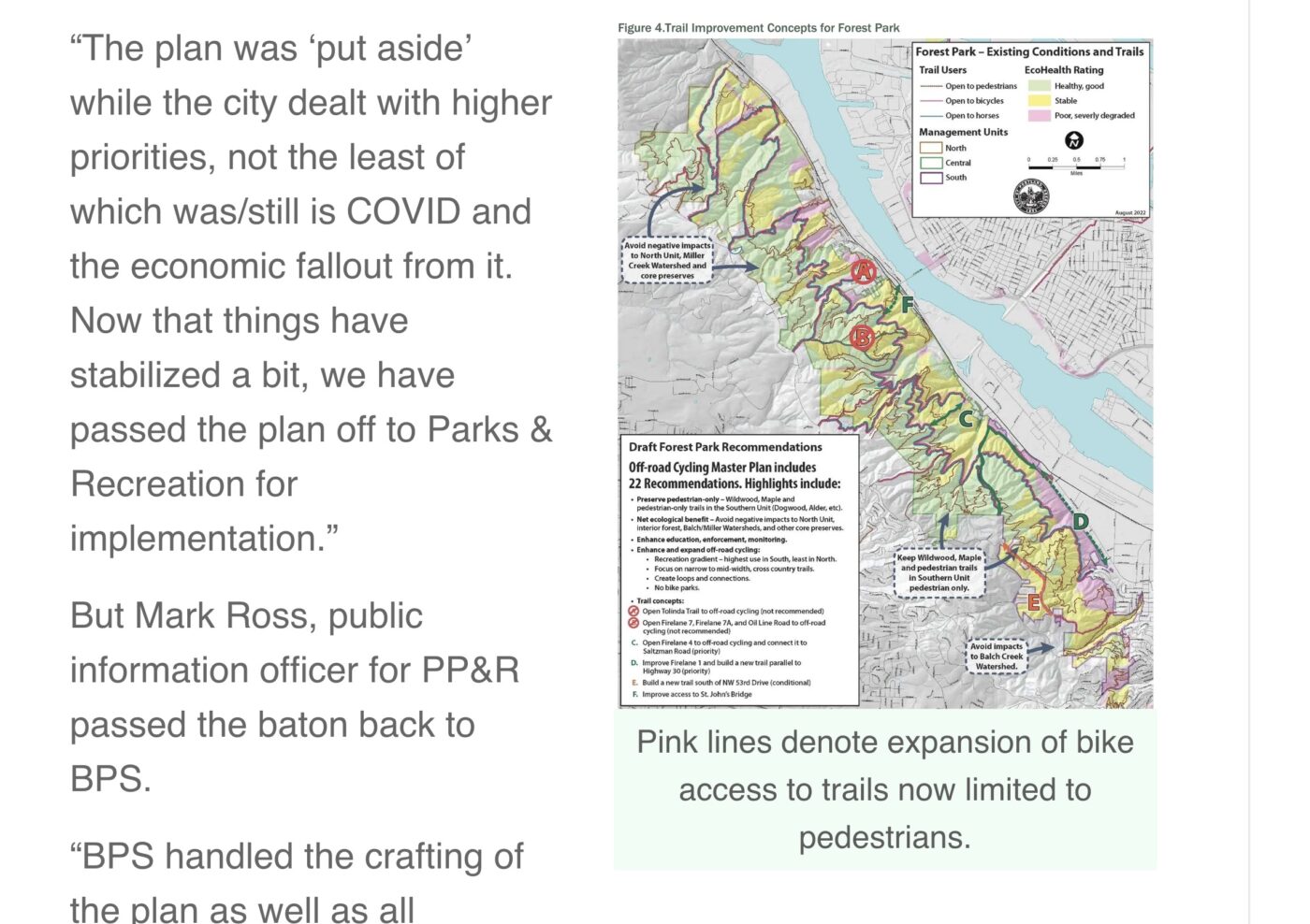
At the start of each Portland Bureau of Transportation Bicycle Advisory Committee meeting, members share general updates and concerns. At the meeting last night, one of the members shared how he had just read an article about the Off Road Cycling Master Plan in the NW Examiner and was worried about what he learned. “The article was about the plan to make trails which are now used by hikers, also open to cyclists… It pointed out that when they did a survey in 2017, 80% of the people opposed this plan. It is a very important issue of concern,” the BAC member shared.
The thing is, the article is very misleading. And unfortunately it’s just the latest example of an ongoing smear campaign. I wouldn’t even mention it here if not for it coming up at the BAC meeting last night and my concerns that NW Examiner Publisher Allan Classen’s work continues to muddy the waters of this very important issue.
It’s clear that as new people cycle into local bike advocacy roles, they might not be aware of Classen’s history. Consider this post another attempt to try and set the record straight.
To refresh, Classen has done admirable work keeping his neighborhood newspaper alive and he is capable of good journalism. But with the issue of cycling, he seems to completely disregard ethics in favor of pushing a specific, anti-cyclist narrative. This is the same person who in 2010 called people who ride in Forest Park “bicycle zealots” in an unhinged op-ed that likened cycling to a religion. That was just one of several efforts over the years where he has crossed the line and made his disdain for cycling and the people who do it crystal clear. And he hasn’t limited it to opinion pieces. He’s referred to the local nonprofit NW Trail Alliance as a “militant” group, coordinated with opponents of cycling in the park for a 2013 story that alleged “illegal cycling” in Forest Park and equated tire tracks in the mud to vandalism, and has repeated a false claim that the ecological health of the park and bicycling are at odds with each other (not only is that untrue but the plan makes it clear that any change to cycling access in the park must have a “net ecological benefit”).
Classen’s latest story completely misrepresents the Off Road Cycling Master Plan, which was officially adopted back in March after languishing in “draft” form since 2018.
Classen takes part in revisionist history about the plan and how the plan came together and in so doing he throws the many hard-working advocates and policymakers who created it under the bus. I’m not here to defend the plan or the process it took to create it, but it should be represented with accuracy.
I’m not aware of the survey he refers to where people were overwhelmingly opposed cycling in the park, but I’m not surprised by that number. It would all depend on how the question was asked. It’s easy to understand how people would respond negatively if the question was framed poorly — especially given how Classen and others in opposition to cycling in the park have spent years misrepresenting the issue.
The article also calls the adoption of the plan a “back room deal.” That’s a stretch given that there were two full years of committee meetings, open houses, and comment periods. This idea that off-road cycling advocates wield great power and influence at City Hall is a common refrain from Classen. But it’s more projection than anything else given the many well-connected, veteran activists who’ve fought cycling in Forest Park for many years — many of whom just so happen to live adjacent to it. The fact that the plan sat on a shelf gathering dust as a non-binding “draft” for six years and we’ve made almost zero progress for cycling in Forest Park in the last two decades shows you were the power truly lies on this issue.
The largest gripe I have with Classen’s latest is the main falsehood he continues to push: that the plan will convert existing hiking trails into shared trails open to bikes. “They’re coming for Wildwood!” (to paraphrase) is what he and others want you to think. But that is not on the table and the plan explicitly says so. Despite that fact, Classen includes a map graphic (at right) with the caption: “Pink lines denote expansion of bike access to trails now limited to pedestrians.” But there’s nothing in that map or the plan itself that says that. This fear-mongering has been a staple of the attack plan from anti-bike voices around this issue for over a decade now and it’s a huge disservice to our city.
To be clear: What bicycling advocates have always wanted is to simply make it easier and more fun to ride bikes in the park. That could take many forms: existing fire roads could be re-aligned to provide a more fun experience; new trails could be built using responsible, modern trail-building methods (of which many of the existing hiking trails in the park don’t adhere to), and so on. And they want to donate thousands of volunteer hours to preserve it and help it sustain a more diverse base of users.
Regardless of what ultimately happens, I have full faith and confidence in NW Trail Alliance. They would be more than capable stewards in the park. That’s clear given the many productive and successful partnerships they already have with agencies like the Bureau of Land Management, Oregon State Parks, Metro, Portland Parks & Recreation, and others. And unlike NW Examiner, they have a long and successful track record of leading — not misleading — our community.



